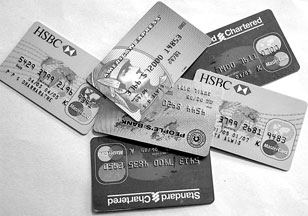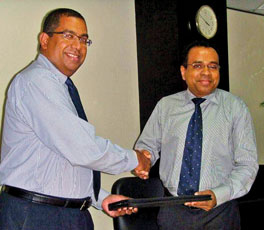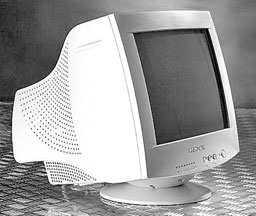Technology
Suzuki laptops, netbooks launched by NETCOM
by Sapumali GALAGODA
Suzuki laptops and netbooks were launched in Sri Lanka by Network
Communications (Pvt) Ltd, (NETCOM), the IT arm of the Adam Group of
companies.
 |
|
Models display the features of laptops
and netbooks
Ruwan de Silva |
The Suzuki laptop is a product that is positioned as a global 'value
for money' brand with the new eco-friendly,slim laptop - Suzuki offers a
no hassle warranty, reliable Japanese technology, high value for
money,energy saving and no eye fatigue with HD LED monitors.
NETCOM has the sole agency rights for the laptops and netbooks from
Suzuki Technology Private Limited, headquartered in Singapore. Suzuki
Technology the proprietors of the brand are one of the most reputed
technology companies in Asia with patents and proprietory rights that
strengthen its competitive advantage in the global marketplace. Suzuki,
named after its promoter Kazushige Suzuki San of Japan aims to
differentiate its brand with continuous innovation and forward looking
technological products.
"We wanted to market a brand which can offer utmost customer
friendly-no hassle warranty service in Sri lanka which is currently not
available (as other brands need lead time to address faculty issues)
with other brands in the market said Chief Operating Officer NETCOM,
Larry Adams. Under the agency contract NETCOM has the right to instantly
trouble shoot laptop issues in the least possible time or replace
machines in Sri Lanka without delays and hassle to the customer.Suzuki
will offer a faster response to customer needs, added Adams.
The netbooks are priced at Rs. 37,000 up and use mercury free LED
backlit panels saving 37.2kWh of electricity annually the equivalent of
planting 1.9 trees. Suzuki was established in 1988.
The brand consists of high quality netbook computers,portable storage
devices, optical disk drives, memory modules, flash based memory, and
graphic accelerators. All products are made to international standards.
Suzuki laptops is a separate entity from Suzuki Automobiles.
Ten tips on using credit cards online
Purchasing services and goods online has become as common as walking
in to a supermarket for some Sri Lankans. As Sri Lankan consumers use
credit cards more often to purchase online they are exposed to a variety
of criminals lurking in the Internet looking to steal their credit card
information. However, you can minimize the risk and use your credit card
safely to purchase goods and services online if you adhere to the tips
listed below, said Sri Lanka CERT.
 Tip 1: Only purchase goods and services from reputed companies When
purchasing online always look for reputed known companies. Tip 1: Only purchase goods and services from reputed companies When
purchasing online always look for reputed known companies.
Companies such as Amazon are well known for online trade. You should
not deal with a company which you have never heard of before or if their
web site looks unprofessional and hastily designed.
If you are a first time buyer from an online merchant do some
research on the organization. See if the contact details are available
in the web site. Any reputed organization should have their contact
details such as hot lines, fax, and email address listed . If you want
to make sure that the merchant's company really exists you may call them
to find out. You can also do a Google search for the company name and
see if there are any adverse comments against them. Another possibility
is to check in an online business directory or yellow pages for
information about the organization.
Tip 2: Enter your credit card details only in secure web sites.
Before you enter your credit card details on a web site check if the
site is really secure. Remember that Internet is a public network.
Whenever you enter your details only the online merchant and you should
be able to read that information. This is achieved by encryption
(scrambling) of information exchanged between you and the merchant. If
the address of the web page starts with https:// (Notice that additional
s at the end of http) that site uses encryption to make information you
send unreadable to outsiders. Another sign to look for is a closed
padlock icon at the bottom of the browser or next to the address bar.
The closed padlock icon also indicates that the site is using
encryption. Furthermore, if you click on the closed padlock your browser
will reveal you the real identity of the web site.
Never enter your credit card details in a web site whose address does
not start with https://, if it does not display a closed padlock or if
the padlock is open.
Tip 3: Read the web site privacy policy. Privacy policy is one aspect
that many people overlook during online purchases. Any organization
collecting your sensitive information such as the credit card number
should be obliged to protect that information.
Browse through the privacy policy of your merchant and see if they
are sharing your information with third parties and what type of
security controls are in place to protect your sensitive information.
Tip 4: Print and keep a receipt of your payment All online merchants
issue a confirmation page with the purchase details once the payment is
accepted. You should print a copy of this page and keep it for future
reference. This may well be the only evidence you have regarding your
online purchase.
Tip 5: Keep your computer secure. Many criminals obtain your credit
card details straight from your computer. Internet is full of various
types of malicious software (malware). Your computer can get infected
with these malware when you visit certain web sites or by opening
suspicious email attachments. Some of these malware will hide in your
system and record your keystrokes (such malware are called keyloggers)
and send them to a criminal. The keystrokes recorded will also include
your credit card number and personal details.
In order to avoid such malware you need to have anti-virus and anti-spyware
installed. Also, you need to update these regularly so that you are
protected against the latest threats. Installing or enabling a personal
firewall will also help to keep away the intruders.
Tip 6: Don't become a victim of Phishing Have you ever received
emails pretending to be from a financial institute asking for your
personal information such as credit card number or Internet banking
password? These emails are scams called Phishing aimed at obtaining your
credit card or other personal information. Never trust such emails and
never click on links in such emails.
Your bank will never ask for your confidential information through
emails. If you need to log on to a particular web site always type the
web site address in the address bar by yourself. Also, check and see if
the site is secure as mentioned in Tip 2.
Tip 7: Check the web site address If you ever click on a link to
visit a web site of a merchant or a financial organization such as a
bank always check the web address in the address bar. Don't be lazy!
Take your time to type the correct web address by yourself rather than
clicking on links.
Tip 8: Subscribe to alert services provided by banks Many banks
provide SMS or telephone alert services which will inform you once an
online payment is made using your credit card. Subscribe to these
services so that any unauthorized use will not go unnoticed.
Tip 9: Don't store your credit card information on computer or paper.
Never write down your credit card information on pieces of paper or
store them in your computer. There is always a chance that this
information may fall in to wrong hands! Destroy any receipts or
statements once you don't need them. Don't throw these to garbage bins.
Tip 10: Be careful when using public computers Never use computers in
cybercafes or Internet kiosks to purchase goods online. You never know
if these computers are secure or not. Public computers may be infected
with malware (Tip 5) or someone might be simply watching your actions
through the network. Especially, be careful when you travel overseas
since you might be compelled to use public computers. It is always a
good idea to inform your bank about your travel in advance.
source : Internet
GTS best in South Asia for 'Colombo Ride 2.0'
The Digital Empowerment Foundation (www.DEFindia.net) along with the
IT ministries of India and Sri Lanka hosted the first ever South Asian
Mobile Content Awards (http://MBillionth.in) in new Delhi recently.
The jury in Colombo spent three days going through 165 nominations
from across South Asia. Participating countries included Afghanistan,
Bangladesh, Bhutan, India, Maldives, Nepal, Pakistan and Sri Lanka.
Awards were given to mobile applications and services in 10
categories: m-governance, m-inclusion, m-news and journalism,
m-education, m-entertainment, m-tourism, m-business, m-health,
m-environment and m-heritage. The awards were announced at a day-long
seminar and evening ceremony drawing over 400 attendees.
GTS (http://gtslk.com) was able to bag the award in the
'm-entertainment' category for their revolutionary Sinhala mobile game
'Colombo Ride 2.0' (http://games.lk) which was released on Independence
day 2009.
Managing Director, Gamos Technology Solutions (GTS) Gihan Fernando
said, "It is a great honour in winning at the South Asian awards. We are
thrilled to hear that our hard work has paid off and our game has
received deserved recognition.
We look forward to launching our next version of the brand 'Colombo
Ride' with new features included in the 3D version, scheduled to be
launched (October 10.) 'Colombo Ride 2.0' a Sinhala multiplayer mobile
game, revolves around a taxi driver who must find passenger to make a
living.
The environment depicted in the game is an identical map of Colombo.
It enables enterprises in and around Colombo to place their
advertisements inside the game. It is an innovative way of educating
those who are unaware of the roads and locations in Colombo. MD of GTS
W. G. T. Fernando receiving mBillionth award and certificate from Chief
Operating Officer of ICTA Reshan Dewapura (who accepted the award in
India on behalf of GTS) Also pictured are Jayantha Fernando (Program
Director, ICTA) and Chitranganie Mubarak (Senior Program Head-e-Society,
ICTA).
The next killer applications for mobiles may come not from a
corporate giant but a garage developer, predicted COO of Sri Lanka's
ICTA Reshan Dewapura. ICTs will be key driver of economies in our
region, he added.
Editor, 'The Asia-Pacific Internet Handbook Madanmohan Rao says
'Mobile phones across the world are surpassing penetration of other
media. Worldwide penetration of mobile phones is estimated at 5 billion,
as compared to cars (800 million), TV (1.5 billion), credit cards (1.4
billion), PCs (850 million), and internet (1.1 billion).
PCH ranked No.1 IT firm
PC House Ltd(PCH), provider of IT solutions was recently included
among local giants in the LMD Most Respected Entities list for their
outstanding contribution towards the betterment of the ICT industry. The
company was the higher ranker of two IT companies to make it onto this
year's list.
The delighted Chairman of PCH S.H.M. Rishan stated, "PCH is gratified
to be ranked alongside some of the biggest and most successful local and
international companies. The ranking carried out by LMD signifies that
PCH continues to pioneer and fine tune the IT industry in Sri Lanka."
PCH aims to expand its services to all parts of the country with
branches in Hambantota, Kilinochchi, Mannar and Mullaitivu.
PCH is about to become the first IT Company in Sri Lanka to be listed
on the Colombo Stock Exchange, following an extremely successful offer
to the public.
ICTA - HISSL sign MoU for e-Health Sri Lanka
The Information and Communication Technology Agency of Sri Lanka (ICTA)
and the Health Informatics Society of Sri Lanka (HISSL) signed an MoU
recently to hold the e-Health Sri Lanka 2010 Conference next month.
 |
|
ICTA COO Reshan Dewapura and HISSL
President Dr. Vajira H. W. Dissanayake after signing the MoU. |
ICTA will be the principal partner of the e-Health Sri Lanka 2010
Conference that will be held from September 15-16 at the Water's Edge.
The two-day conference will be inaugurated at 9 am by Health Minister
Maithreepala Sirisena as the chief guest and Research and Technology
Minister Prof. Tissa Vitharana as the guest of honour. Top personnel in
the Sri Lankan Health and ICT sectors will deliver guest and keynote
talks at the confab. There will be over 60 scientific presentations by
researchers from Sri Lanka and abroad.
ICTA COO Reshan Dewapura and HISSL President Dr. Vajira H.W.
Dissanayake signed the MoU at the ICTA premises. ICTA COO Reshan
Dewapura said that ICTA recognised the need to create a greater
awareness among all stakeholders in the healthcare sector on the
potential of ICT in the delivery of services to the masses.
Explaining the aim of the conference HISSL President Dr. Vajira H. W.
Dissanayake said that e-Health Sri Lanka 2010 was being organised by the
HISSL to promote the use of ICT in the delivery of healthcare in Sri
Lanka. The conference would be an ideal opportunity for those in the
health and IT sectors in Sri Lanka to interact, forge alliances and
contribute to development of e-Health in Sri Lanka, he said.
A high tech titan plagued by potholes
Despite this nation's rise as a technology titan with some of the
world's best engineering minds, India's full economic potential is
stifled by potholed roadways, collapsing bridges, rickety railroads and
a power grid so unreliable that many modern office buildings run their
own diesel generators to make sure the lights and computers stay on.
It is not for want of money. The Indian government aims to spend $500
billion on infrastructure by 2012 and twice that amount in the following
five years. The problem is a dearth of engineers - or at least the civil
engineers with the skill and expertise to make sure those ambitious
projects are done on time and up to specifications.
Civil engineering was once an elite occupation in India, not only
during the British colonial era of carving roads and laying train
tracks, but also long after independence as part of the civil service.
These days, though, India's best and brightest know there is more money
and prestige in writing software for foreign customers than in building
roadways for their nation. And so it is that 26-year-old Vishal
Mandvekar, despite his bachelor's degree in civil engineering, now
writes software code for a Japanese automaker. Mandvekar works in an
air-conditioned building with Silicon Valley amenities here in Pune, a
boomtown about 100 miles east of Mumbai. But getting to and from work
requires him to spend a vexing hour on his motorcycle, navigating the
crowded, cratered roads between home and his office a mere nine miles
away.
During the monsoon season, the many potholes "are filled with water
and you can't tell how deep they are until you hit one," he said. Fixing
all that, though, will remain some other engineer's problem. Mandvekar
earns a salary of about $765 a month. That is more than three times what
he made during his short stint for a commercial contractor, supervising
construction of lodging for a Sikh religious group, after he earned his
degree in 2006.
"It was fun doing that," he said of the construction job. "My only
dissatisfaction was the pay package." Young Indians' preference for
software over steel and concrete poses an economic conundrum for India.
Its much-envied information technology industry generates tens of
thousands of relatively well-paying jobs every year.
But that lure also continues the exodus of people qualified to build
the infrastructure it desperately needs to improve living conditions for
the rest of its one billion people - and to bolster the sort of
industries that require good highways and railroads more than high-speed
Internet links to the West.
In 1990, civil engineering programs had the capacity to enrol 13,500
students, while computer science and information technology departments
could accept but 12,100. Yet by 2007, after a period of incredible
growth in India's software outsourcing business, computer science and
other information technology programs ballooned to 193,500; civil
engineering climbed to only 22,700.
Often, those admitted to civil engineering programs were applicants
passed over for highly competitive computer science tracks. There are
various other reasons that India has struggled to build a modern
infrastructure, including poor planning, political meddling and outright
corruption. But the shortage of civil engineers is an important factor.
In 2008, the World Bank estimated that India would need to train three
times as many civil engineers as it does now to meet its infrastructure
needs.
The government has "kick-started a massive infrastructure development
program without checking on the manpower supply," said Atul Bhobe,
managing director of S. N. Bhobe & Associates, a civil engineering
design company.
"The government is willing to spend $1 trillion," he said, "but you
don't have the wherewithal to spend that kind of money."
Sujay Kalele, an executive with Kolte-Patil, a Pune-based developer
of residential and commercial buildings, said the company's projects
could be completed as much as three months faster if it could find
enough skilled engineers. "If we need 10 good-quality civil engineers,
we may get four or five Kalele said. source : Internet
Cracks in computer defenses abound: IBM
IBM on Wednesday reported that the number of discovered cracks that
hackers could exploit in computer software surged in the first half of
the year.
 The number of new "vulnerabilities" documented by an X-Force Research
and Development team at IBM increased 36 percent to 4,396 from the same
period last year and more than half lacked patches to fix the flaws. The number of new "vulnerabilities" documented by an X-Force Research
and Development team at IBM increased 36 percent to 4,396 from the same
period last year and more than half lacked patches to fix the flaws.
"This year's X-Force report reveals that although threats are on the
rise, the industry as a whole is getting much more vigilant about
reporting vulnerabilities," said IBM Security Solutions general manager
Steve Robinson.
"Threat dynamics continue to multiply and evolve at a furious pace,
making it more crucial than ever to look at unfolding trends so we can
better prepare our clients for the future." Software weaknesses were
most abundant in Web applications, programs accessed in browsers on the
Internet, according to the team. Web application vulnerabilities
accounted for 55 percent of the disclosures.
"These figures may only represent the tip of the iceberg of total Web
application vulnerabilities that exist, as they do not include
custom-developed Web applications," X-Force said in a report of the
findings.
Covert cyber attack tactics on business computers grew in frequency
and complexity, according to X-Force.
Hacker attacks using booby-trapped document files "continue to soar"
as cyber crooks find new ways to trick users, the report warned.
In a bit of encouraging news, the number of "phishing" attacks in
which hackers use email messages to try to dupe people into visiting
bogus websites or opening tainted files plunged 82 percent, according to
X-Force.
"Despite this drastic decline, financial institutions are still the
number one phishing target," the team concluded.
"Credit cards, governmental organizations, online payment
institutions and auctions represent the majority of other targets." (AFP)
Mahindra & Mahindra signs MoU with Ssangyong Motor Company
Mahindra & Mahindra Ltd. (M&M), India's leading manufacturer of
utility vehicles, signed an MoU with Ssangyong Motor Company (SYMC) to
acquire a majority stake in the South Korean SUV maker. This will be
followed by a detailed due diligence process and finalisation of
definitive agreements.
SYMC is a significant player in the SUV segment in Korea, having
recorded 1.3 million SUV sales from 1990 to 2009. Mahindra, a US $7.1
billion Indian multinational, employs over 100,000 people across the
globe. Mahindra enjoys a leadership position in utility vehicles,
tractors and information technology, with a significant and growing
presence in financial services, tourism, infrastructure development,
trade and logistics.
The Mahindra Group is an embodiment of global excellence and enjoys a
strong corporate brand image. Korea is one of the world's leading
centres of automotive excellence and Ssangyong brings with it a rich
legacy of R&D and innovation.
India is a rapidly growing SUV market and will create new growth
avenues for Ssangyong. The synergies between both the brands, which
share a similar heritage, will make us a combined force to reckon with
in the global UV space, said Vice Chairman and Managing Director,
Mahindra Group Anand Mahindra. "We are committed to leveraging
Ssangyong's strong competencies in R&D and technology by investing in a
new SYMC product portfolio which will help us gain momentum in global
markets. Mahindra's focus on alternative fuels and electric vehicles
with the acquisition of REVA, will further strengthen SYMC's brand value
and take it to new geographies," said President, Automotive and Farm
Sector, Mahindra & Mahindra Ltd Dr. Pawan Goenka. Mahindra & Mahindra is
committed to nurturing the SYMC brand in global markets while preserving
its Korean heritage. It is intended that SYMC will continue to function
as an independent entity with Korean management. The acquisition will
offer financial stability to SYMC while making Mahindra & Mahindra the
largest Indian employer in Korea.
Rothschild and Samsung Securities are advisors to Mahindra & Mahindra
Ltd. on this transaction. |

